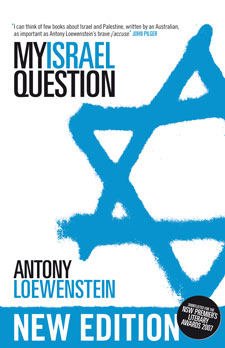Like the original, the new edition of My Israel Question (MIQ) will no doubt prove to be a controversial book. The author, Antony Loewenstein, a liberal Jew, speaks about the abuse that he has received from his fellow Jews, including members of his wider family, because of the views that he espouses in this book and elsewhere.
But why do Loewenstein’s views conjure up abuse from his fellow Jews? What is MIQ all about? Loewenstein tells us when he says:
 “This book examines the extent to which Zionism " the ideology of Jewish nationalism " is to blame for the intractable conflict between Israel and the Palestinians. I am firmly committed to Israel’s right to exist, but I believe there must be a way for Israel to exist securely while allowing statehood and justice for the Palestinians.” (pxxvii)
“This book examines the extent to which Zionism " the ideology of Jewish nationalism " is to blame for the intractable conflict between Israel and the Palestinians. I am firmly committed to Israel’s right to exist, but I believe there must be a way for Israel to exist securely while allowing statehood and justice for the Palestinians.” (pxxvii)
The problem with Zionism, according to Loewenstein, is that it’s insecure (p27), is based on an attitude of racist superiority (p122, 298), its proponents seek to stifle any criticism of Israel by labeling such critics as ‘anti-Semitic’ (which is an awful label to receive in the shadow of the Holocaust) (p151), and its proponents aggressively lobby the media and government so that the Zionist view might prevail over other alternatives (p231).
Loewenstein’s concern is that the success of Zionists in deflecting criticism from Israel will only harm Israel’s future prospects because, in his view, Israel’s current treatment of the Palestinians will only continue to heighten the conflict and weaken Israel. He describes Israel’s treatment of the Palestinians in this way:
“How could one still have blind faith in a country that enacts citizenship laws to prevent Palestinians who marry Israelis from living in Israel with full rights? How could one idealise a nation with an army that, despite Sharon calling it ‘the most moral in the world’, frequently engages in war crimes in the occupied territories, collectively punishes the Palestinian people, and destroys and steals Arab land for expansion of settlements?” (p37)
The original edition of MIQ came out in 2005 but a lot has happened in the Middle East since then and the new edition of MIQ has additional material that covers these events (eg Ariel Sharon’s stroke; the election of a Hamas government in Palestine which brought international sanctions against the Palestinians; and Israel’s war with Hezbollah). Also, a number of people have reviewed the original edition of MIQ since it first came out and there are examples of such reviews at the end of the new edition (including one negative review).
One point that a number of these reviews make is that the original MIQ contained some errors (the amount in question appears to depend upon the reviewer and their position on the Israeli-Palestinian conflict). However the new edition of MIQ doesn’t tell the reader if any of these claims of errors in the original were correct, and if so, whether or not they have since been corrected.
The one negative review contained in the book, by Justice Alan H Goldberg AO, offered one piece of criticism, which I thought was reasonable. He said:
“The author never acknowledges or deals with the intransigence since 1948 of many in the Arab world in relation to the right of Israel to exist.” (p338)
There are always two sides to one story and MIQ is predominantly focused on the ills of Zionism, not the threats to Israel.
Let me state that I am not a Jew and I have nothing against Jews. Indeed I am one who worships the greatest Jew of all, the Lord Jesus Christ. But events like the Hanan Ashrawi affair in 2003 (which partly inspired Loewenstein to write this book), and watching Ted Lapkin of The Australia/Israel and Jewish Affairs Council debate Antony Loewenstein on Lateline after MIQ was first released, has left me convinced that there is truth in Loewenstein’s critique of Zionism’s desire to stifle the Palestinian voice and criticism of Israel.
I cannot say for certain whether Israel’s treatment of the Palestinians is worthy of the criticism that Loewenstein offers. I haven’t been there so I just don’t know. But I wouldn’t be surprised if Loewenstein was at least partially correct. I don’t say this because I’m anti-Semitic but because history has repeatedly shown that the Bible’s teaching on sin and human nature is correct.
The Bible makes it clear that there is no people group who is immune to harming or mistreating others, especially when they hold the balance of power. Israel’s present position of power over the Palestinians provides even more reason why we should be suspicious of anyone who seeks to deflect thoughtful criticism away from Israel (I say “thoughtful” because I recognise that there will inevitably be criticism of Israel based purely on hate).
If you’re looking for a book that will stimulate your thinking about the Israeli-Palestinian conflict, then MIQ will provide you with a perspective on the conflict that is worth thinking through. But wisdom will dictate that it shouldn’t be the only book you read on the subject.





















